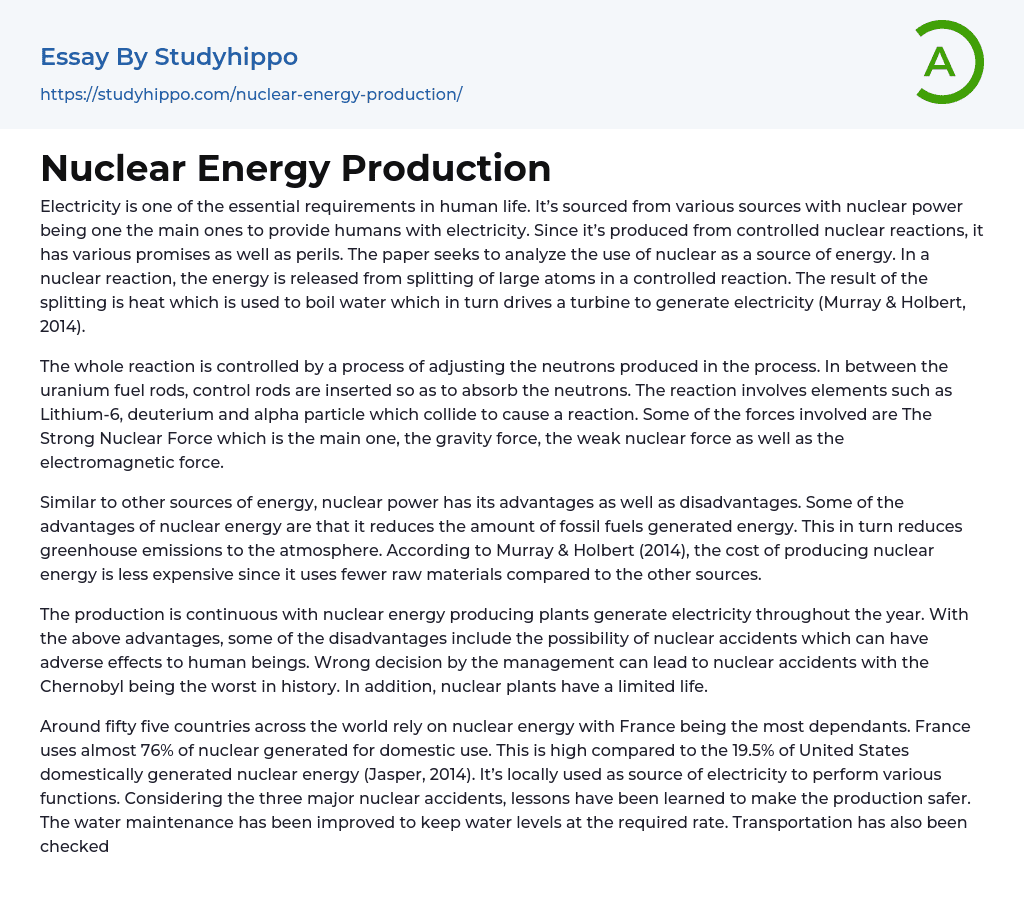Electricity is an essential requirement for human survival.
The purpose of this paper is to analyze the utilization of nuclear power, which is a type of energy obtained from controlled nuclear reactions, such as the division of large atoms. It draws information from various sources and highlights that nuclear power plays a crucial role in fulfilling human electricity demands. This method of generating energy presents both advantages and disadvantages.
Nuclear power is generated by splitting atoms, which creates heat used to boil water. This boiling process produces steam that powers a turbine, ultimately generating electricity (Murray & Holbert, 2014). The manipulation of neutrons in this process controls the entire reaction. To absorb these neutrons, control rods are inserted among the uranium fuel rods. The reaction itself involves collisions between different elements like Lithium-6, deuterium, and alpha particles. Various forces are at play during this reaction includ
...ing The Strong Nuclear Force as the primary force alongside gravity, weak nuclear force, and electromagnetic force. Similar to other energy sources, nuclear power has both advantages and disadvantages.
Nuclear energy offers several benefits, such as reducing dependence on fossil fuels and consequently decreasing greenhouse gas emissions (Murray & Holbert, 2014). It is cost-effective due to its minimal requirement for raw materials compared to other sources. Moreover, nuclear power plants operate continuously and consistently produce electricity throughout the year.
However, there are also disadvantages associated with nuclear energy. One of these drawbacks is the possibility of severe consequences resulting from nuclear accidents, as exemplified by the catastrophic incident at Chernobyl caused by poor decision-making by management.
Additionally, nuclear energy is utilized by approximately 55 countries globally, despite its limited lifespan. France is the largest consume
of nuclear power, as it generates nearly 76% of its domestic electricity from this source. In contrast, the United States relies on nuclear energy for only 19.5% of its domestic consumption (Jasper, 2014). Nuclear power plays a vital role in supplying local electricity for various needs and has gained valuable insights from three significant accidents to enhance production safety.
The improvement of water maintenance has ensured that water levels are maintained at the required rate. Additionally, transportation has undergone scrutiny to enhance safety measures. Numerous countries have placed emphasis on nuclear production due to its status as a key energy source.
References
- Jasper, J. M. (2014). Nuclear politics: Energy and the state in the United States, Sweden, and France. Princeton University Press.
- Murray, R., & Holbert, K. E. (2014). Nuclear energy: an introduction to the concepts, systems, and applications of nuclear processes.
Elsevier.
- Nuclear Family essays
- Alternative Energy essays
- Energy Development essays
- Nuclear Energy essays
- Solar Energy essays
- The elements essays
- Voltage essays
- Atom essays
- Big Bang Theory essays
- Density essays
- Electricity essays
- Energy essays
- Force essays
- Heat essays
- Light essays
- Motion essays
- Nuclear Power essays
- Physiology essays
- Sound essays
- Speed essays
- Temperature essays
- Thermodynamics essays




